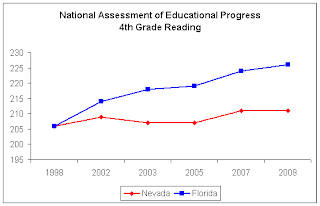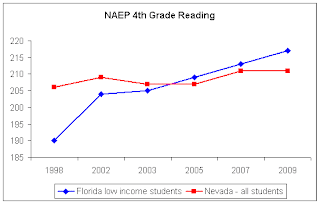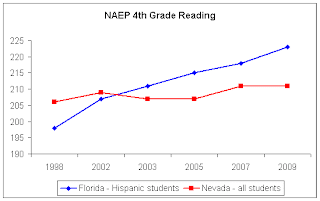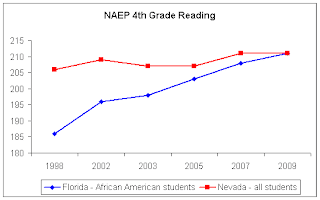
SEIU underfunds worker pensions, overfunds officer pensions
To paraphrase Orwell, in the SEIU, some are more equal than others.
Both of SEIU's two national pension plans, the SEIU National Industry Pension Fund and the Pension Plan for Employees of the SEIU, issued critical-status letters last year. The Pension Protection Act requires any pension fund that is funded below 65 percent of what it needs to pay its obligations to inform its beneficiaries of the deficit...So what has the SEIU been doing to take care of its own members - whom, in theory at least, it should be looking out for? Spent over $85 million electing President Obama and the Democratic congressional majority. As a result of this spending, the "SEIU is $85 million in debt, down from its 2008 high of $102 million, and has been forced to lay off employees." So much for the SEIU's claim of being "dedicated to improving the lives of workers and their families."
An underfunded pension plan does not have enough assets to meet its obligations to retirees in the future. Recovery is difficult if plans are significantly underfunded, as is the case with the SEIU plans. The Pension Benefit Guarantee Corp. (PBGC) insures only a portion of promised benefits to retirees in union multiemployer pension plans. If one of those plans goes bankrupt, the PBGC will guarantee only up to $12,870 in benefits.
Do not worry about Mr. Stern and other high-ranking SEIU officials, though. At age 59, he has 37 years of service in the SEIU and is entitled to a full pension and lifetime health benefits. Unlike SEIU's pension plans for rank-and-file members and union employees, SEIU's officer pension plan, the SEIU Affiliates Officers and Employees Pension Plan, was funded at 102 percent in 2007. (Emphasis added)
Unfortunately, the SEIU isn't the only organization with underfunded pensions (or spending problems). As NPRI's Geoff Lawrence wrote recently, Nevada's pension system is in a similar situation.
[Andrew] Biggs [of the Competitive Enterprise Institute] determined that a market valuation of Nevada PERS assets using an economically sound "options pricing" method of accounting for risk reveals a total unfunded liability of $33.5 billion. At current levels, that would amount to roughly 10 years' worth of state General Fund spending! To put it another way, market-priced unfunded pension liabilities amount to 32 percent of state Gross Domestic Product.Defined-benefit pensions don't work for government, unions or private companies. Nevada needs to switch to a defined-contribution pension system immediately.
According to Biggs' analysis, the probability that PERS' assets will be sufficient to cover accrued liabilities is only 6 percent for police and firefighters and 10 percent for regular employees.
Pro-school-choice Democrat
Pennsylvania state Senator Anthony Williams is running for Governor. Not only does he claim to be against raising taxes, but he also favors parental choice by making the public funding follow the student to whatever school his or her parents choose. To Williams, a public education doesn't mean public school - it means the public helping kids get the best education possible, whether it is from a charter school, virtual school, magnet school, public school, parochial school or private school.
Ending teacher seniority

On Wednesday, I had the opportunity to discuss two dozen education-reform proposals at a meeting of the Legislative Committee on Education. One in particular dealt with the issue of teacher seniority. I suggested prohibiting the use of teacher seniority in determining teacher termination, job transfers and promotions - meaning: no special preferences given to teachers just because they've taught for more years than other teachers.
Nevada, like so many other states, practices "last hired, first fired," which protects senior teachers over younger, less experienced and cheaper teachers. It is true that teachers continue to improve their skills over the first three to five years, but seniority also protects some older, more expensive but bad teachers from being fired.
Worse still, senior teachers are more likely to teach in higher-income schools. This means lower-income kids are more likely to be exposed to inexperienced teachers. Ironically, because of this system, low-income kids not only have the least experienced teachers, but they end up subsidizing the costs of higher-priced teachers at the schools for the wealthier kids (individual schools are "charged" for the average salary rather than the actual salary). Progressive public education, indeed.
Arizona banned the use of seniority in determining teacher terminations this month. But Nevada's Legislative Committee on Education didn't want to discuss the issue further. Meanwhile, civil rights groups in California successfully litigated a case where the judge ruled that firing teachers based on seniority violated low-income children's right to a public education.
Seniority rules in California naturally resulted in younger teachers being fired instead of the older teachers. Consistent with the data from around the country, the younger teachers were far more likely to teach at the low-income schools. In L.A., a third of the teachers at the low-income schools had been dismissed. At the wealthier schools? Hardly a dent.
Maybe the Nevada ACLU will be brave enough to bring a suit against their friends in the Nevada Department of Education?
We shouldn't wait around. If the Nevada Legislature truly cares about improving the quality of education - especially for low-income kids - it will eliminate the concept of teacher seniority.
Live blogging the final Nevada Vision Stakeholder Group meeting
Here we go. The final meeting of the Nevada Vision Stakeholder Group.
Watch live here. Geoff's thoughts are here.
9:05 Lang starts it off. Clarifies that he's from New York, not Virginia. "I picked this place [Nevada]."
Well, welcome Chairman Lang and I hope you enjoy Nevada, but don't think that living here for 5 months or 50 years gives you the right to tell others what determines their "quality of life." It's just especially ironic for someone who just moved here (in January, 2010!) to tell Nevadans what determines their quality of life.
Lang: I don't want to bring big government.
Ummm...have you seen your Preliminary Executive Summary? Although to be fair the NVSG hasn't approved it yet. Which Geoff notes, by the way.
9:09 Lang says universities should get to keep their own tuition. Not a bad idea.
9:12 Lang wonders what the NVSG would be voting on. Looks like there could be another meeting. Says committee members have ACCESS to Moody's. That's a change from before when I've been told that only Lang had direct access to Moody's.
9:14 Moody's is backing away from its Preliminary Executive Summary. "Doesn't represent consensus."
9:15 Again this is a total change. This was "supposed" to be the final meeting.
9:16 Don Snyder: "Not a political process." Wants discussion away from the public forum. "Selectively" add revenue.
Again this was and is a political process, because it was set up by the Interim Finance Committee in order to try and justify raising taxes in 2011. That was the whole point of this process and report.
9:21 Lang continues to back away from the report. "All we have is an executive summary of a report that doesn't exist."
9:23 Snyder: Quality of life promises hollow without a more stable business environment.
Just a reminder to the NVSG, you don't need government to "invest" in order to grow the economy or produce jobs. In fact, government investment hinders new economic growth.
9:27 Katy Simon: "We're just a glorified focus group." Wants to use 4th grade NAEP scores instead of 8th grade. Note: NPRI already uses fourth grade scores, because by 8th grade it's too late for the students.
Couldn't agree more with the focus group comment. Definitely a focus group of those who benefit from larger government.
9:34 Unidentified member of the NVSG is glad Dr. Lang isn't from Nevada. Brought a new perspective.
I wouldn't care where he's from except that the whole point of this group is to determine "quality of life" goals for Nevada. I don't think anyone should determine someone else's quality of life through government, but for someone who just moved here to tell Nevadans what will determine their quality of life is especially distasteful.
9:40 At the moment they are going around the room and each member is giving their thoughts. Will post anything that's particular interesting, but the take away is that this is going to be a long meeting. Nothing will be decided or voted on at this meeting, which is a change.
9:44 Unidentified member talking about innovation in education.
Innovation is going to be key, because nearly tripling inflation-adjusted, per-pupil education spending in the last 50 years hasn't improved student achievement.
9:59 Lang: No part of this document called for tax increases. Guide posts for assuming budget restraint. Cut but give an opportunity to reform. What's the third way?
This I don't disagree with rhetoric-wise. I just don't trust these words after watching four months of this meetings. But I'm willing to trust (but verify). If Chairman Lang or others are looking for ideas on how to increase results while saving money, we'd be more than happy to help. But I'm still skeptical of his intentions.
10:07 Susan Rhodes: This was a draft.
Again this is a big change from before, because today was supposed to be the final meeting (for instance see the title of this blog or check out the NVSG website).
10:14 After listening to about a dozen members talk about the Preliminary Executive Summary, it's clear that the group is no where never consensus. Which isn't surprising, because 19 different people have 19 different ideas of what quality of life looks like. Just like Nevada's 2.7 million people have 2.7 million different ideas about what determines quality of life. That's why it's so ridiculous to think that these 19 people can determine quality of life for 2.7 million people.
That's the beauty of freedom. As long as you don't infringe on someone else's rights, you can do what you think leads to the best quality of life for yourself.
If this was a private group that was going to use private money (and without the force of government) to try and implement these goals, I wouldn't have any objections. The problem is when government tries to determine quality of life goals for individuals.
10:19 Snyder echoes many others grateful to Chairman Lang for his outside perspective and elevating the dialogue. Bonus joke from Snyder that's funny, because it's true! "He's been here three times as long as when we started."
10:29 Busselman objects to the idea in the report that there was ever a consensus. Lang says they've been held back on doing that, because the open meeting laws have prevented free-flowing networking that leads to consensus. Says it would have been different in the private sector.
Yes it would be different in the private sector, because no one in the private sector has the ability to take my money or your money or require us to do certain things. Leave these "qualify of life" ideas in the private sector.
10:34 Busselman mentions that the Brookings Institute says Nevada's local and tax burden is 22nd in the country. Awesome.
Moody's tries to brush it aside.
10:37 Robert Potter wants the NVSG to protect state worker benefits.
Umm ... what happens when Nevada runs out of money, because our pension system is underfunded?
10:43 Potter doesn't remember when the group decided they supported high-speed rail (although it's in the report).
Neither do I.
10:46 Paul Dugan says UNR President isn't happy with graduation rate at UNR! Wants more specific goals for K-12 education.
10:57 Almost done with the first round of comments. Not only is the NVSG not in agreement on the recommendations, they aren't even in agreement in on the structure of the report.
Terry Reynolds says he's for a smaller government in Nevada.
11:05 Lang asks the important question: How should we vote on this? What does the group expect?
In the short term though good news -- we might be out before lunch time.
11:13 Lang: Why need language to defend why. Because we're going to forward it to the legislature.
But wait ... I thought this wasn't a political process? Nope, this is a political document that's going to be used for a political purpose.
11:15 Lang: Wants to vote at the next meeting. Wants a full report, not just an executive summary. There's a hesitancy to vote on this, because we don't have the background info. Lang doesn't want a "hippie" report. Says the report feels too ambiguous.
And for all the grammar nerds out there, Lang wants the report in the active voice. Finally something we agree on.
11:24 Lang wonders if drafts of the report have to be released to the public. Worried the "public" will latch unto an unapproved version of the report. Wonders how to make the process look more like it would look in the private sector.
Easy answer: Do this in the private sector instead of in the political legislative process?
11:31 Rob Potter (public employee) on wanting to keep interim versions of report secret: "It's better to ask for forgiveness than permission."
Wow. And just think, you pay his salary.
11:41 Good point from Keith Smith. Is consensus a majority or unanimity?
11:47 Okay, they're going to vote on each category (education, business climate, etc...) individually and then they are going to vote (up or down) on the whole report.
Lang wants an "efficient" final meeting.
11:52 Voting method approved.
11:53 Date of the next meeting isn't set. Will let you know when it is as soon as I find out.
12:01 Meeting adjourned.
As this is a live blog, please forgive any spelling or grammatical errors.
Read more:
The stakeholder two step
Four problems with the Nevada Vision Stakeholder Group
Puppetmasters on the throne
Nevada's future is at stake
A 'vision' of extortion and control
IFC to hide behind unelected stakeholders
Nevadans deserve honesty from IFC
Tax eaters host a dinner
Nevada's new educational solution: Fewer school days!
Educational achievement in Nevada is dismal. Our high school dropout rate is the worst in the nation. "Nevada's 4th and 8th graders placed no higher than 43rd in math or reading on any of the most recent National Assessment of Educational Progress (NAEP) exams."
This poor performance exists despite nearly tripling inflation-adjusted, per-pupil spending over the last 50 years.
So naturally, the Legislative Committee on Education decided yesterday to move forward on a proposal to eliminate up to 10 school days a year. Not. A. Joke.
The committee did decide to recommend that the 2011 Legislature change state laws to give school districts the flexibility to shorten their school years.Please remind me again why we fund schools: Is it to educate children or to fund jobs for adults? This story makes me think some Nevada legislators believe it's the latter.
The state now mandates a school year of 180 days.
The proposal would allow the state superintendent of public instruction to allow schools to cut as many as 10 days in times of "economic hardship."
Joyce Haldeman, associate superintendent of community and government relations for the Clark County School District, said the proposal could save jobs for teachers and other personnel.
If unions do not agree to "shared sacrifices," or reducing pay, school personnel would have to be laid off, Haldeman said. But the Clark County district can secure $9 million for each day it cuts from the year, and those funds could be used to avoid layoffs.
There are proven alternatives as well. At that hearing, NPRI's Patrick Gibbons presented 28 different recommendations for reform. And reforms like the ones he presented have a proven track record of success. Look no further than Florida, which implemented a host of free-market education reforms in 1998.

More charts after the jump.



Swedish economist explains Swedish economy
Capitalism, not socialism, is what has allowed Sweden to develop and grow wealth. Sweden has lowered taxes, deregulated its economy, embraced free trade and, oh yeah, implemented school choice. That's right: no school zones in Sweden. Tuition money follows the student to whatever school - public or private - his parents choose.
Randal O'Toole on reducing congestion, why high-speed rail fails, and the viability of driverless cars
Last week the Nevada Policy Research Institute hosted Cato transportation expert Randal O'Toole.
Randal gave a really interesting presentation on a wide range of transportation issues, including how to reduce traffic congestion, why high-speed rail is expensive and attracts minimal ridership and ... the viability of driverless cars within the next 10 years.
Yes, you read that last part right - the technological viability of driverless cars in the next 10 years. If you think that sounds like science fiction, read the RJ's Adrienne Packer's review of O'Toole's presentation.
If O'Toole's prediction is correct, those of us who shudder and wince at the thought of leaving behind our convenient and comfortable vehicles can rest easy.Intrigued? Then watch for yourself.
He firmly believes driverless vehicles will lead the way in transportation revolution.
Goofy science fiction, right? Admittedly, I rolled my eyes too. But O'Toole's presentation was intriguing.
For more information on O'Toole's work, check out his blog, The AntiPlanner.
Doug Busselman's take on the Nevada Vision Stakeholder Group's Preliminary Report
Doug Busselman of the Nevada Farm Bureau has an absolutely must-read blog post on the NVSG's initial report. Doug has the unique perspective of being both a voting member of the NVSG and a supporter of the free market and limited government.
Some highlights:
Although the Vision Stakeholders group is given credit for being the source of the document -- it really represents the Moody's consultant's perspective of what they consider the input we gave along the way. This was done in a process and timeframe which didn't actually string together in a way where "the consensus" that is attributed to us could have been achieved. At this point, the words being put into our mouth don't really represent anything more than what might be something a majority of participants could agree to adopt...Read the whole thing.
At this point, the quality of "vision" is very questionable to at least one member of the group who I have the ability to speak for (myself). My view is that this document (at this point) is an extremely disjointed set of politically-correct concepts thrown at the wall in hopes that something might stick and be included in a government-centric outcome. Its scope and assorted variety of ideas don't constitute a substantive vision which most Nevada citizens can either buy-in on or even be capable of understanding.
For more, read the RJ's article on the report or Tom Mitchell's blog post, "What do you get for a quarter of a million dollars worth of visioning?"
Moms should become MAD
That's MAD as in Mothers Against Debt, by the way. Although once you understand how debt is going to burden American kids you'll probably be just plain mad as well.
I know it's a little late, but Happy Mother's Day to all the moms out there. Hope you had a wonderful and special day.
Reason interviews Oscar Goodman

Reason Magazine, a publication of the libertarian Reason Foundation, our sister think tank in Los Angeles, interviews Las Vegas Mayor Oscar Goodman in their newest issue. The interview is titled, "Gin, Girls, and Governance." Check it out.

 Read more
Read more